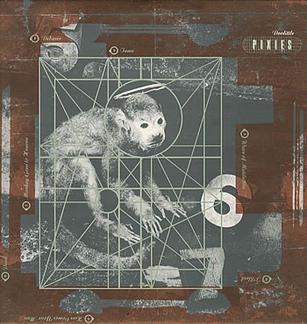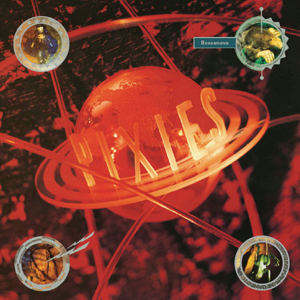
Pixies is an American alternative rock band formed in 1986, in Boston, Massachusetts. Until 2013, the band consisted of Black Francis, Joey Santiago, Kim Deal and David Lovering (drums). They disbanded acrimoniously in 1993 but reunited in 2004. After Deal left in 2013, Pixies hired Kim Shattuck as a touring bassist; she was replaced that year by Paz Lenchantin, who became a permanent member in 2016.

Charles Michael Kittridge Thompson IV is an American singer, songwriter, and guitarist. He is best known as the frontman of the alternative rock band Pixies, with whom he performs under the stage name Black Francis. Following the band's breakup in 1993, he embarked on a solo career under the name Frank Black. After releasing two albums with record label 4AD and one with American Recordings, he left the label and formed a new band, Frank Black and the Catholics. He re-adopted the name Black Francis in 2007.

Kimberley Ann Deal is an American singer-songwriter and multi-instrumentalist. She was the bassist and the co-vocalist in the alternative rock band Pixies, before forming the Breeders in 1989.

Doolittle is the second studio album by the American alternative rock band Pixies, released in April 1989 on 4AD. Doolittle was the Pixies' first international release, with Elektra Records as the album's distributor in the United States and PolyGram in Canada.

Surfer Rosa is the debut studio album by the American alternative rock band Pixies, released in March 1988 on the British label 4AD. It was produced by Steve Albini. Surfer Rosa contains many of the elements of Pixies' earlier output, including Spanish lyrics and references to Puerto Rico. It includes references to mutilation and voyeurism alongside experimental recording techniques and a distinctive drum sound.

Bossanova is the third studio album by American alternative rock band Pixies. It was released on August 13, 1990 by English independent record label 4AD in the United Kingdom and by Elektra Records in the United States. Because of 4AD's independent status, major label Elektra handled distribution in the US.

Come On Pilgrim is the debut EP by the American alternative rock band Pixies, released on September 28, 1987 on 4AD. Produced by Gary Smith, the release consists of eight tracks from a seventeen-song recording session that the band had recorded at Fort Apache Studios in March 1987.

Joseph Alberto Santiago is a Filipino-American guitarist and composer. Active since 1986, Santiago is best known as the lead guitarist for the American alternative rock band Pixies. After the band's breakup in 1993, Santiago produced musical scores for film and television documentaries, and he formed The Martinis with his ex-wife, Linda Mallari. He also contributed to albums by Charles Douglas and former Pixies band-mate Frank Black. Santiago resumed his role as the Pixies' lead guitarist when they reunited in 2004.

Trompe le Monde is the fourth studio album by the American alternative rock band Pixies, released on September 23, 1991 on 4AD in the United Kingdom and on September 24, 1991 on Elektra Records in the United States. Recorded in Burbank, California, Paris and London, the album was produced by Gil Norton, and was Pixies' final studio album before their subsequent break-up two years later. Trompe le Monde is the last album to feature founding bass guitarist Kim Deal.

David Lovering is an American musician and magician. He is best known as the drummer for the alternative rock band Pixies, which he joined in 1986. After the band's breakup in 1993, Lovering drummed with several other acts, including The Martinis, Cracker, Nitzer Ebb and Tanya Donelly. He also pursued a magic career as the Scientific Phenomenalist, performing scientific and physics-based experiments on stage. When the Pixies reunited in 2004, Lovering returned as the band's drummer.

Pixies is an EP by the American alternative rock band of the same name, released in 2002 by SpinART Records in the U.S., Cooking Vinyl in the UK and Sonic Unyon in Canada. It consists of the remaining songs from the band's original 17-track demo tape, eight songs of which were released in 1987 as the band's debut, Come On Pilgrim. All 17 songs were recorded by Gary Smith at Fort Apache Studios in March 1987.

Frank Black is the debut solo album by American alternative rock musician Frank Black. The album was recorded in 1992 and released on March 8, 1993 via 4AD and Elektra Records, after the breakup of Black's band the Pixies.

The UK Singles Downloads Chart is compiled by the Official Charts Company (OCC) on behalf of the music industry. Since July 2015, the chart week runs from Friday to Thursday, with the chart date given as the following Thursday.

"Here Comes Your Man" is a song by the American alternative rock band Pixies, written and sung by the band's frontman Black Francis. Produced by Gil Norton, it was released as the second single from the group's second album Doolittle in June 1989.

"Monkey Gone to Heaven" is a song by the American alternative rock band Pixies. Recorded in November 1988 during the sessions for the band's 1989 album Doolittle, it was released as a single in March, and included as the seventh track on the album when it was released a month later in April. The song was written and sung by frontman Black Francis and was produced by Gil Norton. Referencing environmentalism and biblical numerology, the song's lyrics mirrored themes that were explored in Doolittle. "Monkey Gone to Heaven" was the first Pixies song to feature guest musicians: two cellists, Arthur Fiacco and Ann Rorich, and two violinists, Karen Karlsrud and Corine Metter.
Benjamin Mumphrey is an American record producer, audio engineer, and musician.

The discography of Pixies, an American alternative rock band, includes eight studio albums, twelve singles, seven compilations, one mini-LP, and five EPs as of October 2022.

Mountain Battles is the fourth studio album by American band The Breeders. It was released in the United Kingdom on April 7, 2008, and in the United States on April 8, 2008. The album was gradually recorded in a number of different locales including Refraze Recording Studios in Dayton, Ohio, by engineers including Steve Albini, Erika Larson, Manny Nieto and Ben Mumphrey.

Fate to Fatal is an EP by the American alternative rock band the Breeders, released on Period Music, on April 21, 2009. It was recorded in three different locations by multiple engineers: the title track was recorded at the Fortress Studios, London with producer Gareth Parton; "The Last Time", which features lead vocals by Mark Lanegan, and "Pinnacle Hollow" were recorded by Ben Mumphrey in Dayton, OH; "Chances Are", a cover of a Bob Marley song, was recorded by Steve Albini at Electrical Audio in Chicago.

















